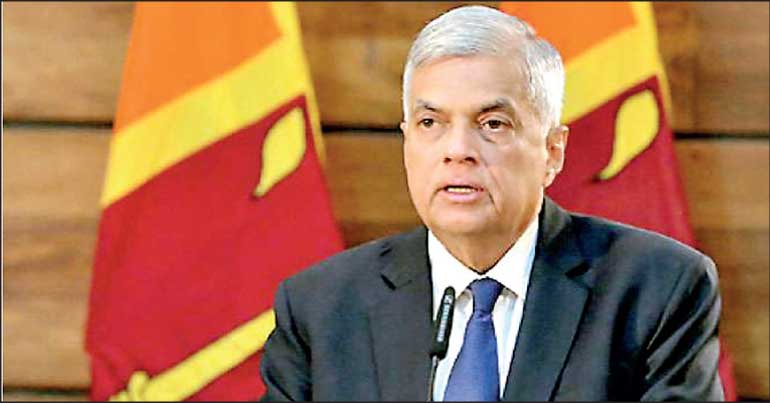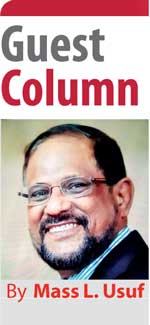Tuesday Feb 17, 2026
Tuesday Feb 17, 2026
Saturday, 16 July 2022 00:17 - - {{hitsCtrl.values.hits}}

Why reject Ranil? The answer is simple. He does not represent the Sovereign will of the people – neither as Prime Minister nor as the Acting President
 At 70, the then Prime Minister J.R. Jayewardene became the first President of the Democratic Socialist Republic of Sri Lanka under the Second Republican Constitution of 1978. The architect of the present constitution which introduced the Executive Presidency, concentrating power and authority in that Office. This harbinger of doom over the years metastasised the utter destruction of this country. JR was popularly known to be crafty, shrewd and a schemer. The public used to call him a ‘Fox’. According to biographer K.M. De Silva, J.R. Jayewardene was cherishing a new nickname: “the Old Fox.”
At 70, the then Prime Minister J.R. Jayewardene became the first President of the Democratic Socialist Republic of Sri Lanka under the Second Republican Constitution of 1978. The architect of the present constitution which introduced the Executive Presidency, concentrating power and authority in that Office. This harbinger of doom over the years metastasised the utter destruction of this country. JR was popularly known to be crafty, shrewd and a schemer. The public used to call him a ‘Fox’. According to biographer K.M. De Silva, J.R. Jayewardene was cherishing a new nickname: “the Old Fox.”
Interestingly, Ranil is the nephew of J.R. Jayewardene. Since his early days in politics, Ranil was nurtured by “The Old Fox”. Under his uncle, he was the youngest cabinet minister of Sri Lanka, when he became the Minister of Youth Affairs and Employment at the age of 29. This is sufficient description to indicate who Ranil is.
Ranil a misfit
“... the only clue to what man can do is what man has done. The value of history, then, is that it teaches us what man has done and thus what man is” so said the English philosopher R.G. Collingwood.
Why reject Ranil? The answer is simple. He does not represent the Sovereign will of the people – neither as Prime Minister nor as the Acting President. He had lost the confidence of his own electorate and was rejected outright at the 2020 elections. He entered Parliament through the nomination list and not as an elected representative. He was the only representative in Parliament of a grand old party, the United National Party, which is widely believed to have been destroyed by Ranil. Creating history in the realm of constitutional democracy, the corrupt President Gotabaya Rajapaksa who has now fled the country fearing prosecution, appointed such a person as the Prime Minister in May this year. Ranil’s predecessor Mahinda Rajapaksa had to resign due to the popular uprising against him. Ranil lacked the moral fibre to decline this appointment and inveigled himself pretending to be the saviour of the nation.
The wisdom of Thucydides, the 4th century BC Athenian historian, is illustrative. “We all look with distaste on people who arrogantly pretend to a reputation to which they are not entitled; but equally to be condemned are those who, through lack of moral fibre, fail to live up to the reputation which is theirs already.”
In fact, as at present, the entire self-serving Rajapaksa clan has gone into hiding fearing the wrath of the masses for making this country bankrupt through corruption, waste and nepotism. Ranil Wickremesinghe which is his name, has been rechristened by the people as Ranil ‘Rajapaksa’ because the people know very well that he is a protector of the Rajapaksas. The people of the country rejected Ranil when he was sworn in as the Prime Minister after the forced resignation of Prime Minister Mahinda Rajapaksa. They demanded not only the resignation of President Gotabaya Rajapaksa but also that of Prime Minister Ranil Wickremesinghe.
Overall, Ranil has been effectively using the training he received under “the Old Fox” and up to now has survived against the wishes of the common masses. For how long, is a question only time can answer.
Independent President
The next President should not be someone from within the present Parliament and, that obviously includes Ranil. The reason for that is two-fold. Firstly, the people have wholesale rejected the members of the present Parliament, when they say that all the 225 must go. Undoubtedly, not all the Members of Parliament are corrupt but, the majority are, according to the people’s perception. Secondly, the task of the new President is going to be onerous as he has to clean the Augean stable. The people are yearning for a ‘System Change’ therefore, to appoint an independent person with integrity and the spine to effect this change becomes an important consideration.
How to do it?
All Members of Parliament must agree to decide on a candidate from outside of the Parliament. Then bring that person through the national list and vote that person unanimously to fill in the vacancy of the President.
First, the Parliament has to unanimously select three candidates from a given list of recommended persons from outside the Parliament. Names for the list can be suggested by those in the Aragalaya, civil bodies, political parties, etc. Then, the Parliament will vote to elect one of these three candidates. Upon finalising the selection bring in that person into Parliament through the national list. Of course, one of the present national list members will have to facilitate such an entry.
The Prime Minister can be appointed from among the members of Parliament. The reason for this is, the newly appointed President may require guidance and directions from a political, bureaucratic and parliamentary angle to function in his Office.
Pledge by President and Prime Minister
Prior to their appointments, both the proposed President and the Prime Minister must take a pledge, ensuring the people, that in pursuance of an efficient and clean governance, they will do the following in addition to the normal constitutional duties relating to their respective positions. Each of these to be bound by a timeline for completion during the tenure, with exceptions.
1. Reducing the powers of the Executive President and transferring same to a Parliamentary system. For example, holding ministerial portfolios, appointment of Cabinet ministers, Secretaries to Ministries, proroguing and dissolution of Parliament, etc.
2. Open deliberations to decide between the choices of abolishing the Executive Presidency or continuing the Presidency as a ceremonial figure Head and decide on the best option.
3. Establish the Constitutional Council with majority of members comprising non-parliamentarians. Ensure the independence of the Constitutional Council and bind it to act with transparency with accountability to Parliament.
4. Empower the Independent Commissions by strengthening its finances, provision of resources and bind it to act with transparency with accountability to Parliament.
5. Ensure strict and effective checks and balances of governmental functions through Parliamentary Committees and other institutions. Appointment of Members to the Parliament Oversight Committee, Special Purpose Committees and Legislative Standing Committee to be based on knowledge, expertise and understanding of the relevant disciplines. Make provisions for specialists from outside to assist the Committees’ functions.
6. Initiate reforms, mechanisms and prosecutorial legislations against bribery, corruption and waste of public funds. Strengthening of the Commission to Investigate Allegations of Bribery or Corruption (CIABOC) Act in this regard.
7. Introduce post enactment judicial review by the Supreme Court.
8. Enhance the Independence of the Judiciary and strengthening of the rule of law.
9. Revisiting the court cases of the politicians/bureaucrats that have been questionably closed.
10. Tracing and recovery of misappropriated public funds.
11. Explore areas for the prosecution of members of the Government, bureaucrats, others who were engaged in corrupt activities. And, those who were directly or indirectly accomplices to the current state of bankruptcy.
12. Probe into the Easter Sunday bombing.
13. Broad based amendments to the election law.
This is not an exhaustive list but captures a major portion of the much desired ‘System Change’. All of above may be done in consultation with civil society organisations, professionals, academics, experts in the relevant disciplines. The people, all have been awakened and aware of the manipulations of the politicians. Therefore, do not fool the masses with silly and nonsensical amendments like that of the 22nd Amendment.
This is a very good opportunity for the 225 members to demonstrate their commitment to democracy and display their true patriotism. Basically, to enhance their goodwill within their electorates. Remember, the 225 members will be closely watched by the people as to how each would react to the proposition of a clean and efficient governance system.
(The writer holds an LL. B (Hons) UK, and is an Attorney at Law (Ex-Advisor to former Presidential Private Department of UAE). He can be reached via email: [email protected].)